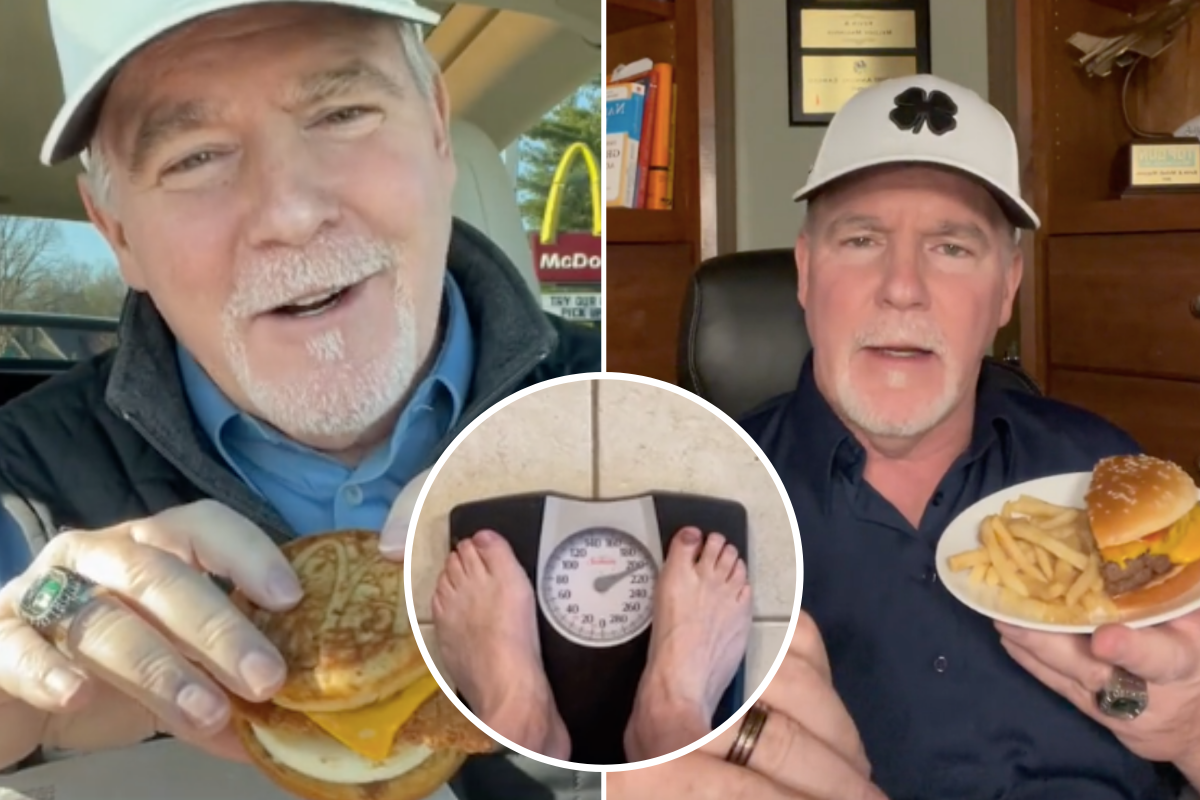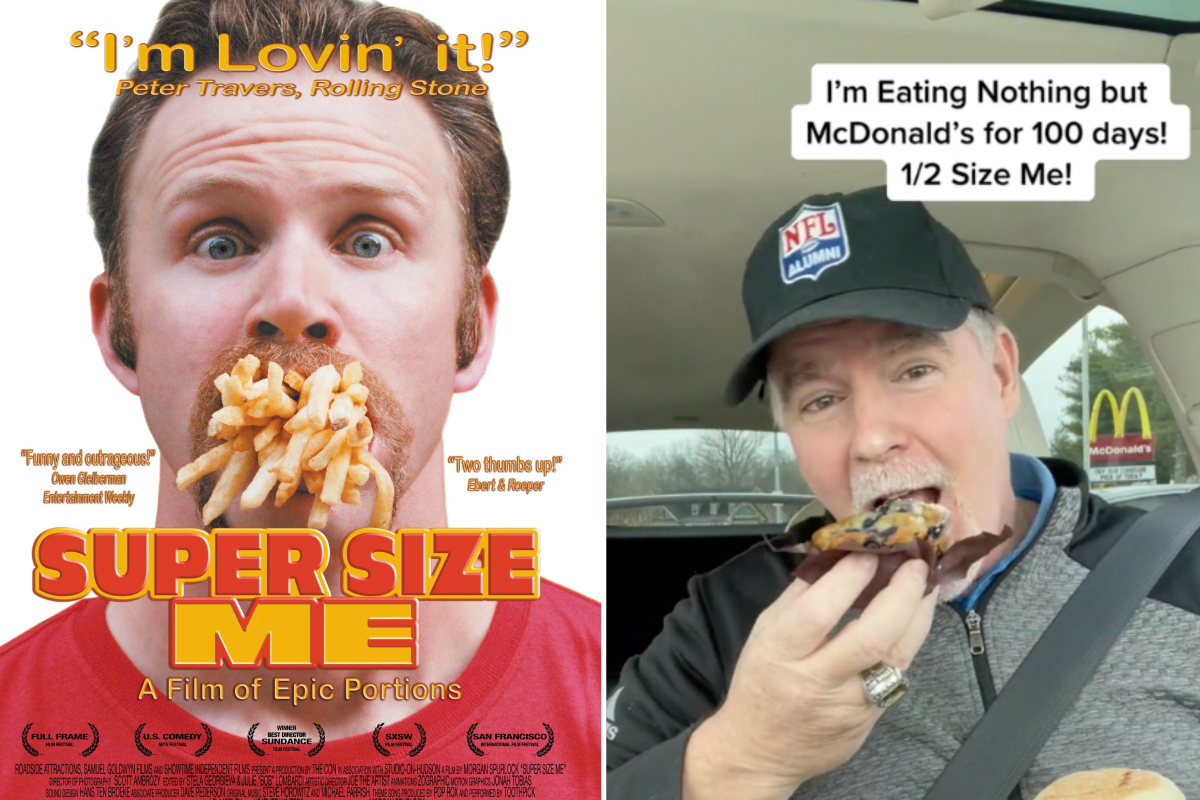When trying to lose weight, fast food is usually the first thing that many cut out of their diet. Strict rules see dieters salivating as they pass their favorite restaurants or longing for a single french fry.
But one man has flipped the concept of dieting on its head by creating an unusual diet strategy that involves only eating foods that many would see as the ultimate diet sin—McDonald's.
Kevin Maginnis, 56, decided to eat only McDonald's food for 100 days in an effort to lose weight.
"On February 21 I realized that I was at 238 pounds," Maginnis told Newsweek. "I remember reading somewhere that when your waistline reaches 40 inches for a man that was too big, it's dangerous. When I saw my scale creeping up to 240 pounds, that 40 number just scared the heck out of me."

With his weight increasing, he thought of his family: "I knew if I wanted to live longer for my grandkids, my wife, my kids...I had to do something. Get this obesity off me to give me a better chance to be able to be there for my family," he said.
But is a diet like this healthy? Signe Svanfeldt, a lead nutritionist for the healthy eating app Lifesum, told Newsweek there are significant risks to eating only fast food.
"For optimal well-being, eat a varied and balanced diet in line with your energy requirement. Eating the same thing daily will not provide the variety of nutrients needed, which leads to nutrient deficiencies," she said.
"A diet rich in fast foods, typically rich in saturated, unhealthy fats, sodium and sugar, will make you feel sluggish, while a varied diet filled with fiber, unsaturated fats, protein, vitamins and minerals will make you feel energized while providing all the nutrients you need."
Obesity affects around one in five children and one in three adults in the United States, according to the Centers for Disease Control and Prevention (CDC). An estimated 70 million adults in the country are obese, and in 2017 over 41 percent of the population was classified as obese.
A person can be considered obese if their weight is much higher than what is considered healthy for their height. For adults, a body mass index of 30 or more falls within the obese range, while a BMI of 40 or more is classified as severe obesity.
From 1999-2000 through 2017-March 2020, U.S. obesity prevalence increased from 30.5 percent to 41.9 percent, the CDC says. During the same period, severe obesity increased from 4.7 percent to 9.2 percent.
Obesity is linked to significant health problems, including a higher risk of serious conditions like heart disease, stroke, Type 2 diabetes, types of cancer and poor mental health.
But when most people think of the golden arches, weight loss is one of the last things that come to mind. So why did he decide on McDonald's?
"I'm big and my last name is Maginnis," he said, laughing. "Big Mac has always been a nickname for me, and I figured why not just roll with it."
Maginnis' mission is simple—he will only eat McDonald's food for 100 days for every meal, but each portion would be cut in half.

You would be forgiven for making a comparison to the 2004 documentary Super Size Me, in which Morgan Spurlock undertook an experiment to exist entirely on McDonald's food for a whole month. But unlike Spurlock, Maginnis is following strict rules when it comes to the amount of food he consumes.
"This is half-sized," he said. "That was super-size me, this is half-size me. It's only McDonald's, three meals a day, but I'm cutting each meal in half. I seek the heat before I eat."
To "seek the heat," Maginnis always waits until he is hungry to eat. "We don't drink water until we can't fit any more water in," he said. "We drink water until we're not thirsty. So I'm just eating enough to be sated, not stuffed."
By waiting until he feels a hunger pang, or "the heat," Maginnis ensures he isn't overeating. "I'm always getting rid of what's in my stomach before adding more food in. Allowing my body to start tapping in on my fat reserves."
On a normal day, Maginnis will start with a sandwich—a creation of his own making that he calls a McNulty. To make the sandwich, he orders a sausage, egg and cheese McGriddle but replaces the sausage with a crispy chicken patty and has a round egg and bacon on top—all purchased from the fast food giant's menu.
"I'll have that and hash browns for breakfast, but I'll only have half," he said. A single McDonald's hash brown contains 262 calories. "Then for lunch, I'll have the same thing."
In the evening, he returns to McDonald's for a final meal.
"I'll pick out a numbered meal, something like a Big Mac meal, and I'll just cut it in half and eat half of that for dinner and then half I'll carry over to the next day," he said, adding that he spends around $5 a day on the diet.

His enviable 100-day plan will still see his efforts pale in comparison to The Guinness World Records holder for the most Big Macs eaten in a lifetime— which is held by Donald Gorske, who has devoured over 32,000 of the burgers, eating two every day since 1972.
Clocking in at 1,080 calories for Big Mac Combo Meal with a medium soda and medium fries, that means half of the order sees Maginnis eating around 540 calories per meal.
By Day 50—the halfway point—he has already lost 38 pounds and plans to keep going for 50 more days, sharing the journey online. To ensure his experiment is as clear-cut as possible, Maginnis has even stopped exercising.
"I stopped exercising, stopped taking any vitamins and supplements," he said. "Because I wanted to isolate just portion control for this 100 days so no one can say, Well, it might not have been the McDonald's."
Maginnis' counter-intuitive diet has captured viral attention as he shares his mission on TikTok under the handle @bigmaccoaching. With over 77,000 followers, and he updates the world daily with his progress and thoughts on the experiment.
Since the start of the experiment, Maginnis has kept his doctor in the loop and gets regular tests.
"I had my bloodwork at the beginning and about 14 days in," he said. "All of the indicators improved. All of the biomarkers improved. My cholesterol when down and my triglycerides went down."
He went on: "I've talked to multiple doctors, both before and during this—and people on TikTok who are doctors and cardiologists. Just like the rest of TikTok—who are around 30 percent 'We're with you,' 30 percent 'This is crazy, you're too old to be playing with your health,' and 30 percent grabbing the popcorn to see what happens—the doctors seem to be the same."
It's only McDonald's, three meals a day, but I'm cutting each meal in half."
He said. "Obesity is the killer. Not the food itself," he said. "It [leads to] heart attacks, strokes—so many things—but it's the obesity that is dangerous. Far more dangerous than a french fry.
"I'm not saying I'll do this for the rest of my life. I'm doing it as an experiment for 100 days to identify if my health improves over the 100 days—not just my weight but my health too," he said.
Svanfeldt recommends a more traditional approach. "For weight loss, a steady, sustainable pace is crucial," she said. "Eating a varied and balanced diet, with plenty of nutrient-rich foods, including vegetables, whole grains, fruits, nuts, seeds and lean protein, while staying within a healthy calorie deficit, is key."
But Maginnis stands by his experiment and said he is seeking to develop a habit that will last a lifetime. "That's what's going to help me live longer. I believe if I eat three smaller meals a day and seek the heat before I eat, that is sustainable. Eating McDonald's every day for the rest of my life—that's not sustainable. But eating three smaller meals is."
Newsweek reached out to McDonald's via email for comment.
Is there a health issue that's worrying you? Let us know via life@newsweek.com. We can ask experts for advice, and your story could be featured in Newsweek.
Uncommon Knowledge
Newsweek is committed to challenging conventional wisdom and finding connections in the search for common ground.
Newsweek is committed to challenging conventional wisdom and finding connections in the search for common ground.
About the writer
Alice Gibbs is a Newsweek Senior Internet Trends & Culture Reporter based in the U.K. For the last two years ... Read more
To read how Newsweek uses AI as a newsroom tool, Click here.





